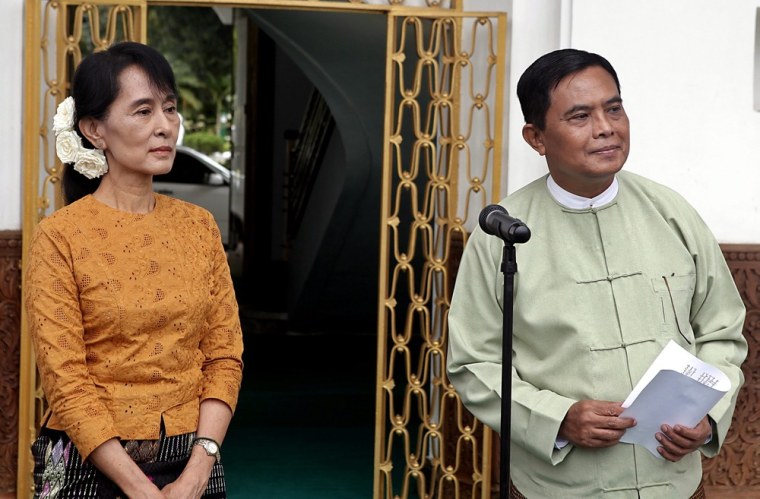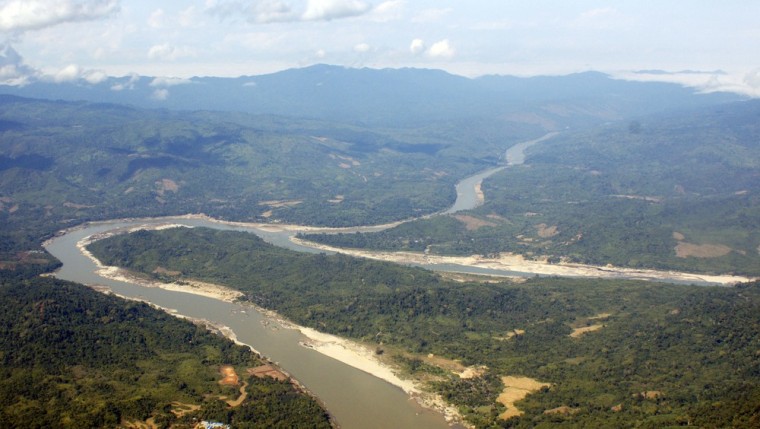Myanmar's government will suspend a $3.6 billion, Chinese-led dam project, President Thein Sein told parliament on Friday, in an apparent victory for supporters of pro-democracy leader Aung San Suu Kyi.
Thein Sein's call for the controversial hydroelectric project in the country's north to be halted was a rare and surprising concession to opponents that was welcomed by the nation's pro-democracy movement and environmentalists.
The Myitsone dam project in Kachin state should be terminated because "it is against the will of the people," Thein Sein said in a statement read out on his behalf at Parliament.
The Myitsone dam, Myanmar's largest hydropower project, had sparked rare public criticism in the authoritarian country. It was backed by hardliners with ties to Chinese investors and opposed by an increasingly vocal band of reformers.
It was not immediately clear when or how the project could be halted, however.
Either way, the call marks a startling turnaround for the government. Earlier this month, Electric Power Minister Zaw Min vowed the project would go ahead despite swelling opposition that looked set to put the government on a collision course with the nation's democracy movement.
Environmental activists have said the dam — the construction of which has already begun — would displace countless villagers and upset the ecology of one of the country's most vital national resources, the Irrawaddy River. It will also submerge a culturally important site in the ethnic Kachin heartland where the Malikha and Maykha rivers meet to form the Irrawaddy.
The Myitsone dam would export about 90 percent of electric power it generates to neighboring China, according to the government. The vast majority of Myanmar's residents, meanwhile, have no electricity.
"This is the first time in 50 years that the government has given in to the wishes of the people," said Dr. Than Tut Aung, a prominent publisher who is also one of the leading advocates of the "Save the Irrawaddy" campaign. "The decision to suspend the dam project is not just an environmental issue but a national issue. We welcome the good news."
Thein Sein came to power in March after the nation's long-standing junta disbanded, promising to bring democratic reforms to one of Asia's most repressive nations.
But skeptics see his government — dominated by retired military officers — as a proxy for continued army rule, and there has been much debate over whether his reform pledges are rhetoric.

Hope for change
The new government has boosted hope for change by unblocking the long-censored Internet, calling on exiles to return, and holding rare talks with prominent opposition leader Aung San Suu Kyi, who was released from seven years of house arrest last year.
Yet more than 2,000 political prisoners remain behind bars, while fighting with multiple armed ethnic rebellions has displaced about half a million people within the country and forced at least 200,000 more to flee abroad.
On Friday, Suu Kyi met for a third time with Labor and Social Welfare Minister Aung Kyi, part of an ongoing and new dialogue between the two sides. There was no word on their talks.
Last month, Suu Kyi joined forces with activists opposing the Myitsone dam. She said about 12,000 people from 63 villages had already been forced from their land. The government has put the figure far lower, saying around 2,000 people have been relocated.
"It's very good of them to listen to the voice of the people," said Suu Kyi, who has spent nearly 15 of the past 21 years under house arrest. "I welcome this."
Thein Sein's statement was read out during a Parliament session in the capital, Naypyitaw, by lower house speaker Thura Shwe Mann.
"We have to honor the wishes of the people and we have to seriously consider and settle the concerns of the people," the statement said. "Hence, the construction of Myitsone hydropower dam project shall be suspended."
The will of the people was seldom considered under the military regimes that made Myanmar one of Asia's most reclusive and repressive countries for almost 50 years.
No date was given for the termination, but the statement said it would happen during Thein Sein's term, which ends in 2015.
The statement said the government will negotiate with China on how to terminate the contract with state-run Chinese companies that are funding and building the dam.
"This is President Thein Sein showing he can exercise his executive power and that he can stand up against China," said Aung Zaw, editor of the Irrawaddy magazine.
Environmental groups say such projects are helping fuel violence in the region as government forces struggle to secure them. In June, fighting broke out in Kachin state for the first time in two decades at the site other Chinese-backed dam projects opposed by rebels and local residents.
